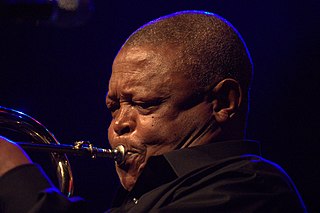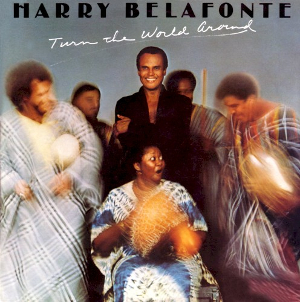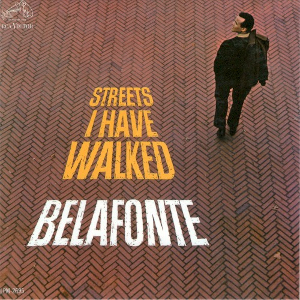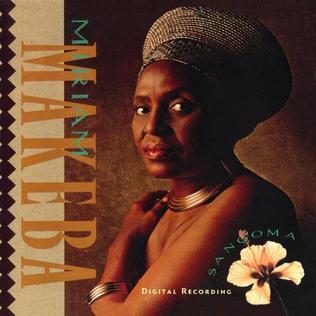
Hugh Ramapolo Masekela was a South African trumpeter, flugelhornist, cornetist, singer and composer who has been described as "the father of South African jazz". Masekela was known for his jazz compositions and for writing well-known anti-apartheid songs such as "Soweto Blues" and "Bring Him Back Home". He also had a number-one US pop hit in 1968 with his version of "Grazing in the Grass".
Tony Cedras is a South African accordion, harmonium, keyboard and guitar player. He was born in Elsie's River, Cape Province, South Africa in 1952. He has performed or recorded, most often on accordion, with various well-known artists, including Paul Simon, Harry Belafonte, Miriam Makeba, Henry Threadgill, Muhal Richard Abrams, Cassandra Wilson, Hugh Masekela, Tony Bird and Gigi. Tony got his first professional break under the tutorship of Pacific Express bass player, Paul Abrahams. He was drafted into the band as a trumpet player and keyboard player. He was in every lineup of Paul Simon's band from 1987 to 2012, despite not, as yet, featuring on a studio recording with Mr Simon

"Grazing in the Grass" is an instrumental composed by Philemon Hou and first recorded by the South African trumpeter Hugh Masekela. Released in the United States as a single in 1968, it reached number one on the Billboard Hot 100 chart, ranking it as the 18th biggest hit of the year. The song also reached #15 Adult Contemporary. Masekela included the song in his albums Grazing in the Grass: The Best of Hugh Masekela (2001), Still Grazing (2004), and Live at the Market Theatre (2006).

Belafonte Returns to Carnegie Hall is a live double album by Harry Belafonte. It is the second of two Belafonte Carnegie Hall albums, and was recorded May 2, 1960. It peaked at #3 on the Billboard Pop albums charts.

Welela is a Miriam Makeba album mixed at Condulmer Recording Studios in Venice, Italy by Allan Goldberg of Phonocomp in the end of 1989, except for "Pata Pata" which was mixed at Psycho Studio in Milan, February 1990.

Turn the World Around is an album by Harry Belafonte, released in 1977.

An Evening with Belafonte/Makeba is a Grammy Award-winning 1965 album by Harry Belafonte and Miriam Makeba, released by RCA Victor. It was the second outcome of the long lasting collaboration between Belafonte and Makeba, the first being the appearance of Makeba in the song "One More Dance" on Belafonte's 1960 album, Belafonte Returns to Carnegie Hall.

Streets I Have Walked is an album by Harry Belafonte, released in 1963. The album contains songs from around the world as well as gospel songs. It reached #30 on the Billboard Albums 200, making it his last studio album to reach the top 40.

Belafonte at The Greek Theatre is a live double album by Harry Belafonte, released by RCA Victor in 1963. It was his last album to appear in Billboard's Top 40.

Belafonte on Campus is an album by Harry Belafonte, released in 1967.

Belafonte Concert in Japan is a live album by Harry Belafonte, released in 1974. It is the only album by Belafonte that has been released in Quadrophonic. The album was Belafonte's final release for RCA Records, concluding a 21-year association with the label.

Paradise in Gazankulu is an album by Harry Belafonte, released by EMI Records in 1988. As of 2020, it is Harry Belafonte's final studio album. The album deals with the plight of black South Africans under the Apartheid system. The album was re-released as an official mp3 download by amazon.com, and iTunes in the U.K. in 2010.

The Very Best of Harry Belafonte is a compilation album by Harry Belafonte, released by Legacy Records in 2012. It includes fourteen of his best-known songs released from 1956 through 1966.
"Soweto Blues" is a protest song written by Hugh Masekela and performed by Miriam Makeba. The song is about the Soweto uprising that occurred in 1976, following the decision by the apartheid government of South Africa to make Afrikaans a medium of instruction at school. The uprising was forcefully put down by the police, leading to the death of between 176 and 700 people. The song was released in 1977 as part of Masekela's album You Told Your Mama Not to Worry. The song became a staple at Makeba's live concerts, and is considered a notable example of music in the movement against apartheid.

You Told Your Mama Not to Worry is the twentieth studio album by South African musician Hugh Masekela. It was recorded in Kumasi, Ghana and released on November 9, 1977 via Casablanca Records label.

Home is a 1982 studio album by South African jazz trumpeter Hugh Masekela. The album was re-released as a CD in 1996 via Columbia Records with a slightly rearranged track listing.

Sixty is a 2000 studio album by South African jazz trumpeter Hugh Masekela. It was recorded in Johannesburg, South Africa and released via Shanachie label.

The Many Voices of Miriam Makeba is a 1962 studio album of Miriam Makeba.
The Voice of Africa is the 1964 fourth album of Miriam Makeba issued by RCA Victor. It charted at #122 on the US album chart.

Sangoma is a 1988 album by Miriam Makeba. It was a comeback album after a long pause since Comme une symphonie d'amour in 1979, spurred by touring with Paul Simon.
















